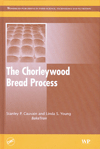Proposals to thwart bakers from calling their products ‘organic’ if they use conventional baker’s yeast could ‘dramatically impact availability in the organic bakery product category,’ warns the American Association of Bakers.
Until now, standard (non-certified organic) baker’s yeast is on the U.S. Dept. of Agriculture’s (USDA) National Organic Program's (NOP's) national list of non-organic agricultural products allowed to be used as ingredients in products labeled organic, says Lee Sanders, senior vice president, government relations and public affairs for the American Bakers Association (ABA), Washington, D.C.
“Yeast is [currently] included in this NOP list under a group of substances referred to as non-synthetic or natural substances,” she says. But last October, USDA’s NOSB recommended an annotation to be added for yeast on the national list that states, “When used as food or a fermentation agent, yeast must be organic if its end use is for human consumption. Non-organic yeast may be used when equivalent organic yeast is not commercially available.”
If this is approved at the NOSB meeting, April 26-29 in Seattle, it could have major ramifications for the organic bakery category, as organic yeast is “not readily available,” says the ABA, which has written to NOSB along with The International Food Additives Council (IFAC) outlining its concerns.
Sanders says that this annotation will result in a “serious restriction for bakeries in North America to produce organic bread.” To add to bakers’ woes, in March 2010, the NOP issued a guidance document for certification of organic yeast (NOP 5014) requiring that raw materials or substrates for growing organic yeast must also be certified organic, says IFAC executive director Haley Curtis Stevens.
Source: www.foodnavigator-usa.com
Get our new eMagazine delivered to your inbox every month.
Stay in the know on the latest snack and bakery industry trends.
SUBSCRIBE TODAY!Copyright ©2024. All Rights Reserved BNP Media.
Design, CMS, Hosting & Web Development :: ePublishing




